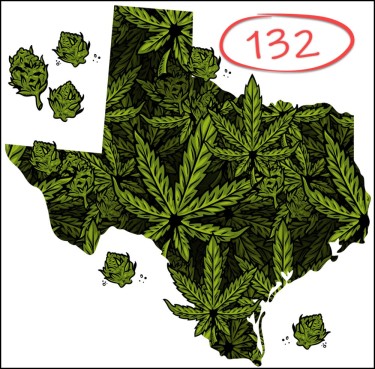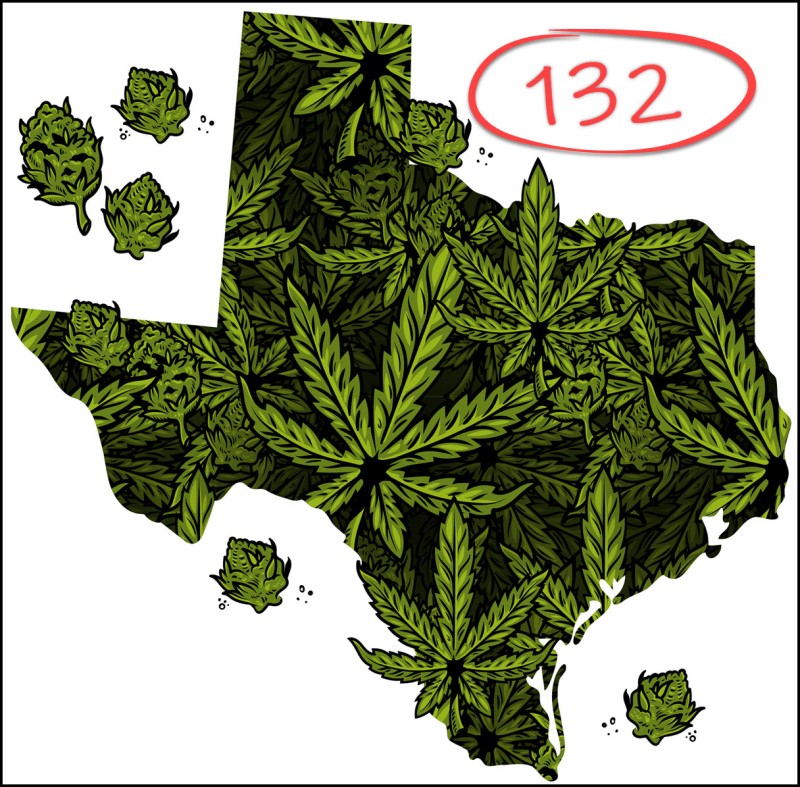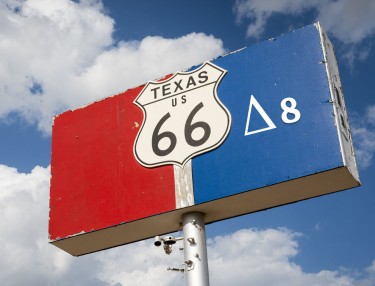
On January 16, the Regulatory Services Division (RSD) of the Texas Department of Public Safety (DPS) announced that officials were accepting applications for new licenses under the Compassionate Use Program (CUP) for dispensing organizations.
Prospective applicants for the new medical cannabis dispensary licenses could utilize the designated RSD application form for submission. The application period ended at 5 p.m. C.T. on April 28.
Individuals who had previously applied for a cannabis retail license could reapply using an updated application form. Furthermore, applicants seeking reapplication had their application fees waived.
The DPS had outlined plans to unveil a comprehensive process for the acceptance and approval of applications later. However, the specific number of licenses to be issued remained undisclosed at the time.
As stated in the announcement, the department would only issue licenses in quantity sufficient to guarantee reasonable statewide access to low-THC cannabis for patients registered in the compassionate-use registry.
Expanding Qualifying Conditions for Medical Cannabis
The legislative effort to enhance medical cannabis accessibility in Texas is advancing in the state Legislature. House Bill 1805 received approval from the House Public Health Committee on March 20.
The bill suggests widening the range of qualifying conditions to include any condition leading to chronic pain that would typically require an opioid prescription, as detailed in the bill text.
The proposed measure seeks to substitute the existing 1% THC limit for cannabis oil with a volumetric dose of 10 milligrams. While Delta-8 THC products have flooded into Texas due to the lack of a medical or recreational cannabis program, this is the first step in correcting that black market success.
It's worth noting that the initially introduced legislation had sought to raise the THC limit from 1% to 5% by dry weight. However, the committee opted for an amendment, choosing the volumetric dose approach instead.
On March 7, H.B. 218, aiming to decriminalize small amounts of cannabis possession, received unanimous approval from the Texas House of Representatives with a 9-0 vote, as reported by CHRON news. The Compassionate Use Act, enacted by Texas lawmakers in 2015, permits physicians to prescribe low-THC cannabis to patients with qualifying medical conditions.
Initially limited to epilepsy, the legislation has since broadened its scope to include conditions such as seizure disorder, multiple sclerosis, spasticity, amyotrophic lateral sclerosis, autism, cancer, post-traumatic stress disorder, and incurable neurodegenerative diseases, as outlined by the Texas State Law Library.
Research into low-THC medical marijuana, primarily distributed to patients through tincture oils and gummies, has expanded. According to House Public Health chair Stephanie Klick, Texas lawmakers and citizens have shown support for broadening access to the program.
She stated that her intent then and now is to establish a genuinely medical program based on scientific data," emphasizing her sponsorship of the legislation that established the original program.
Since its inception, the Compassionate Use Program in Texas has registered approximately 45,000 patients, with an active participant count ranging from 10,000 to 12,000, as noted by Nico Richardson, the interim CEO of Texas Original, the state's largest medical cannabis provider based in Austin. A parallel but more inclusive program in Florida currently boasts around 700,000 enrolled participants.
During a public hearing on March 13 before the House Public Health Committee, military veterans shared with lawmakers how medical marijuana, accessible through the Compassionate Use Program, had played a crucial role in helping them overcome both trauma and pain.
Some veterans highlighted their awareness of fellow veterans experiencing significant pain who were not part of the program and, with opioids not being a viable option, resorted to obtaining cannabis through illicit channels.
Navy veteran Ramona Harding, who has PTSD due to military sexual trauma, emphasized that the marijuana she obtained through the state program doesn't induce a high. Instead, she explained, it alleviates the pain, allowing her to function more effectively.
In mid-March, Klick's bill successfully cleared her committee with a unanimous vote of 10-0.
During the committee hearing, only one individual, a socially conservative Texas Eagle Forum member, registered opposition to the bill.
Supporters of the legislation encompassed advocates for individuals with disabilities and mental health challenges, along with endorsements from the Libertarian Party, the Texas Chapter of the American College of Physicians, and the Center for Health Care Services, serving as the mental health authority for Bexar County.
Application Request for Medical Cannabis Dispensary Licenses
Although Texas regulators do not currently have immediate intentions to broaden the state's medical cannabis program, the Department of Public Safety (DPS) has garnered over 130 applications from individuals seeking to establish a dispensary.
The application window, spanning from January 16 to April 28, saw 132 submissions, as reported by a department representative.
Despite the closure of the application process in the spring, the representative clarified that there is no fixed deadline for approving the applications, and there are presently no initiatives to expand the state's medical cannabis program.
In April, the Texas House of Representatives passed a bill aimed at expanding the medical cannabis program by introducing additional qualifying conditions and raising the state's THC limit beyond 1%. However, the bill's progress came to a standstill in the Senate.
Texas initially enacted its medical cannabis law in 2015, allowing three licensed dispensaries to sell low-THC cannabis to patients registered in the Compassionate Use Program.
The state has authorized these dispensaries to provide cannabis oil specifically to seizure patients. Nevertheless, obtaining the oils can still be challenging, with only 18 doctors licensed to prescribe them.
To qualify for this medical treatment, Texans must have attempted two FDA-approved drugs without success. Additionally, patients must be permanent residents of Texas and obtain approval from two of the 18 doctors listed on the Compassionate Use Registry of Texas.
Conclusion
Recent endeavors in the Texas House of Representatives to broaden the medical cannabis program have faced setbacks in the Senate. Since the inception of the state's medical cannabis law in 2015, allowing for three licensed dispensaries, obtaining access to low-THC cannabis has proven to be an intricate process.
The authorization for cannabis oil, particularly for seizure patients, involves a limited number of prescribing doctors and strict qualifying criteria. The landscape of medical cannabis in Texas reflects a delicate balance between legislative advancements and the practical challenges faced by patients seeking this form of treatment.
TEXAS AND DELTA-8 THC PRODUCTS, READ ON...
TEXAS VS. DELTA-8 THC PRODUCTS, THE CONSUMER HAS SPOKEN!






